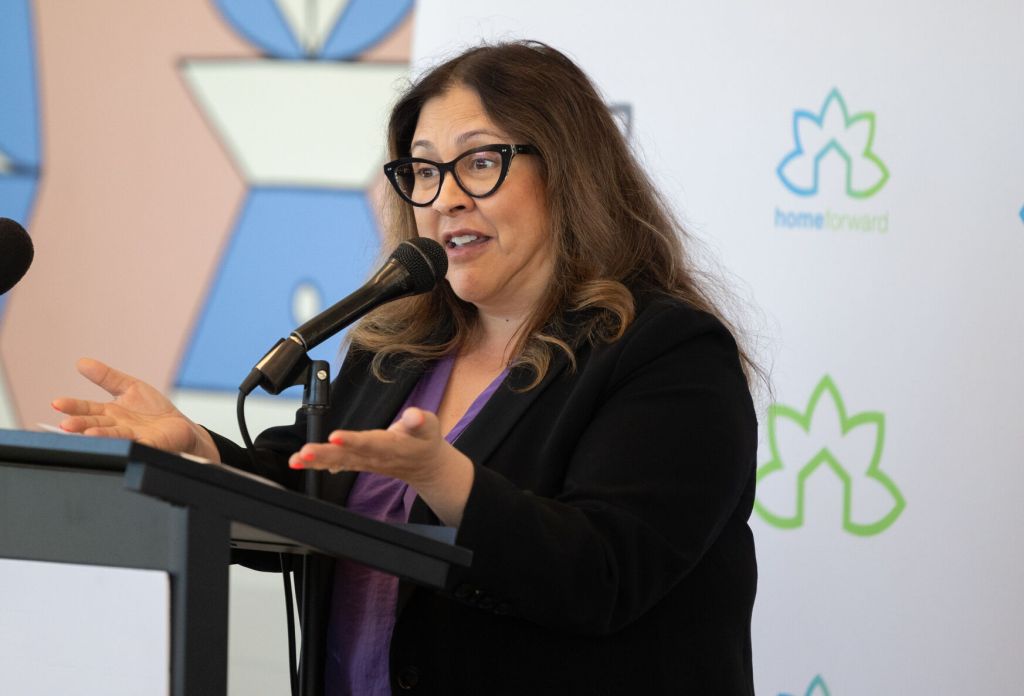Portland mayoral candidates spar at first major debate
Published 3:30 pm Thursday, September 12, 2024

- Portland City Commissioner Carmen Rubio gives remarks during a ribbon-cutting ceremony for the new Hazel Ying Lee affordable housing building in Southeast Portland. Affordable housing was a major topic at this week’s mayoral debate.
The 2024 Portland mayor’s race formally kicked off with a debate between three leading candidates on Thursday, Sept. 12, before the Portland Metro Chamber.
Trending
The candidates were businessman Keith Wilson and city commissioners Rene Gonzales and Carmen. They qualified by receiving 750 individual contributions each by the scheduling deadline. Commissioner Mingus Mapps also was invited but did not respond in time to participate.
All three candidates agreed that Portland is still struggling to recover from the depths of the pandemic, the social justice protests, and the surge in homelessness that upended life beginning in 2020. Each promised to accelerate the recent improvements that include less crime, garbage and visible outdoor campers, but some disagreements emerged during the debate.
Wilson, who owns a three-state green trucking company, repeatedly cast himself as an outsider who has taken it upon himself to create a nonprofit agency to reduce homelessness. He blamed Gonzalez and Rubio for not solving more problems sooner, saying, “If you like the way the city’s being run, I’m not your guy.”
Trending
For her part, Rubio portrayed herself as a consensus builder, taking credit for several reforms passed by the council in recent years, including a consolidated permitting process and financial incentives to encourage the conversion of vacant downtown office space to housing.
“I’m ready to act on day one,” Rubio said.
Gonzalez took credit for focusing on crime and homelessness during the past two years, saying that he defeated the commissioner who advocated defunding the police — Jo Ann Hardesty — and stood up to “the loud voices disrupting the city” by prohibiting city employees he oversaw from handing tents and tarps out to the homeless.
“When you elected me two years ago, I didn’t hide who I was and I grind away on that every day,” Gonzalez said.
The debate with moderated by KOIN 6 News Political Director Ken Boddie who posed a series of questions about problems in Portland to the three candidates. They included the need to create tens of thousands of more units of all kinds of homes to bring prices down and to house those on low incomes.
Rubio said no one has done more than she has to create more housing. She cited her efforts to streamline the city’s notoriously complex permitting processes, city code deregulations, incentives for office to housing conversions and increasing the city’s commitment to affordable home ownership.
Wilson questioned how well the city’s efforts are working, saying he is aware of a public affordable housing construction project underway in the Lloyd District that costs twice as much per unit as a nearby equivalent private one. He also said other cities are converting more offices to housing than Portland, saying that the financial incentives Rubio championed are too narrowly focused.
For his part, Gonzalez said Prosper Portland, the city’s economic development agency, should be more involved in creating housing. The council transferred its housing programs and funding to the Portland Housing Bureau in 2009. He also said Rubio’s permitting reforms effectively waived the state requirement that permits must be approved within 120 days.
All three supported hiring more police but varied on the specifics. Wilson said the top priority should be filling the existing 80 vacancies in the Portland Police Bureau. Gonzalez said the bureau needs between 1,000 and 1,200 more officers. Rubio did not offer a number but said it was important that the new hires be as diverse as the city’s population.
Rubio and Gonzalez clashed on several occasions. While taking credit for her accomplishments, Rubio said Gonzalez had not contributed to the process but voted for them anyway. At one point, Gonzalez questions how much they had really accomplished.
“To be blunt, our economic recovery has been an abject failure in the city of Portland. We have pushed a lot of paper that’s not leading to new jobs, that’s not leading to new construction, it’s not leading to more capital flowing into the city, sorry to be blunt, but that is our reality, that is what we are dealing with today,” Gonzalez said.
Another disagreement concerned the creation of overnight homeless shelters. Wilson said other cities have found them effective at reducing homelessness far below Portland’s current level, which reduces crime, too.
“I have done the research, I’ve gathered the team, I founded a successful shelter and I created a roadmap for our city. I am the candidate who has the executive experience that the new mayor’s role will require to lead this project successfully,” said Wilson, the founder of Shelter Portland.
Rubio opposed that, saying congregate shelters without services are the least effective way to reduce homelessness, and called for the current emerging system of Safe Rest Villages, larger managed outdoor shelters, and permanent sportive housing to be expanded.
“When I took office, I knew that we needed more shelters, so I changed city code to make it possible to stand up shelters and transitional housing that we needed to reduce houselessness,” Rubio said.
In her closing statement, Rubio said the status quo was not acceptable and she would work to turn the city around without creating conflict or divisions. Wilson said his two opponents had years to build coalition and produced results but haven’t, promising that he will. Gonzalez said he would continue to pursue the same values, even if some people disagree with him — noting than an arsonist had torched one of his family’s vehicles without changing his views on the issues.
Nineteen candidates are running for mayor. Under the Portland Charter reforms approved by voters in 2022, the mayor, city auditor and 12 new members of the City Council all will be elected by ranked-choice voting on Nov. 5.






